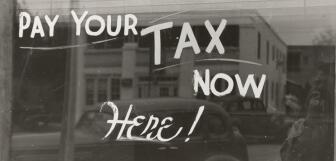What Are Allowable Expenses in Business?
Keeping track of your business costs is essential for ensuring that your money is being spent wisely. It can help you review and assess each expense individually, and ensure that you’re in line with tax regulations.
When you understand allowable expenses and record your finances properly, you can actually earn quite a lot of money back at the end of each tax year.
Here, we cover which expenses are tax-deductible, which aren’t, and what changes when you’re self-employed. You might be wondering, what are allowable expenses and what counts as personal expenses when you work from home? This guide will help you save money in key business areas, while playing your cards right with the taxman.
What exactly are allowable expenses in business?
In a nutshell, allowable expenses are essential business costs that you don’t have to pay tax on. They’re tax-deductible costs that aren’t considered part of your taxable profits. For example, if your business makes £25,000 in revenue, but you spend £4,000 on allowable expenses, you’ll only be taxed on the remaining £21,000.
There are some rules around allowable expenses. In some places, businesses can access a tax-free trading allowance. In this case, these businesses aren’t eligible to claim expenses outside of their allowance. For further guidance, you’ll have to check your government website about which option is best for your business.
It’s vital that you understand which things you can claim as an allowable expense, or you’ll unnecessarily waste business money. Worse, if you claim a tax deduction on too many of the wrong things, you could be flagged for tax avoidance.
What counts as allowable expenses and what doesn’t?
Allowable expenses are things that you need to pay for in order to run your business properly. For that reason, you don’t pay tax for these costs. Here are a few things that you can access tax-free, and some surprising things that you’ll pay duty on.
Costs of running your business premises
You can claim expenses for:
- Business property rent
- Property and equipment repairs and maintenance
- Water heating systems and plumbing
- Business and water rates
- Utility bills
- Property insurance
- Insurance for your home office or studio (ONLY the areas where you work)
- Building security
You cannot claim expenses for:
- Buying your business property
- Areas in your home that are used for work and general living. I.e. if you work at your kitchen table, insurance and maintenance are not tax-deductible.
Office costs
You can claim allowable expenses for the following office items. It’s really important to keep receipts and proof of expenses.
- Stationary
- Computers, laptops, and monitors
- Office furniture like chairs and desks
- Work-related software that is used within a year of purchase
- Printers
- Scanners
- Laminators
- Business phones and devices
- Postage and packaging for the above-listed items
- Phone and internet bills held in the company’s name
If you work from home and your phone or broadband bill is in your own name, you can claim a percentage of it back as tax-deductible.
Staff costs
The following staff costs are tax-deductible:
- Wages and salaries
- Bonuses
- Pensions
- Employer’s national insurance (UK)
- Recruitment costs
- Overtime and other expenses incurred due to unfilled job posts
- Training courses related to the business or job role of the employee
- Work uniforms
- Protective clothing and equipment
- Childcare costs (up to a certain limit)
A new suit or business attire, or everyday clothes worn to the office in the instance of there being no uniform policy, are not tax-deductible.
Travel costs
Keep a mileage log of business journeys, and receipts to claim the following allowable expenses while working away from your typical location/office:
- Fuel and mileage
- Parking
- Train tickets
- Toll bridge charges
- Reasonable food & drink expense if you’re traveling from your home to a temporary workplace
- Repairs, maintenance and servicing business vehicles
- Business vehicle MOT (UK)
Travel costs that are part of your daily commute are not allowable expenses. Daily food and drink expenses are not reimbursed, either.
Professional service and financial expenses
You can claim tax relief on a number of financial and operational expenses:
- Accountant or bookkeepers fees, or the price of related software
- Solicitors fees
- Quantity surveyors fees
- Business loans fees
- Business credit card charge
- Business overdraft fees
- Business bank charges
Fines or lawsuit charges are not an allowable expense. You also can't claim for the associated legal costs of buying your business premises.
Operational costs
The following items are counted as allowable expenses:
- Printing business cards and posters
- Building a business website
- Online advertising and marketing costs
- Stock purchases for the purpose of reselling
The most important thing to remember is that you can’t claim for costs that have a dual personal and business purpose. If you’re unsure what allowable expenses your businesses can or can’t claim, consult your accountant, or check on the government website. It may seem draining to keep a track of every single expense, but it’ll be well worth it at the end of the tax year.
Business expenses vs. personal expenses
For self-employed individuals and freelancers, the lines can sometimes blur between business and personal expenses. The rule of thumb is that you can only claim business costs as allowable expenses. For amenities like electricity and internet that you use for both business and personal use, you can claim allowable expenses for a proportion of the cost, not the whole bill. To do this, calculate what percentage of the bill is used for running your business.
For example, if you have a house made up of five rooms with an annual electricity bill of £550 a year, and you use one of these rooms solely as an office, you can expense a proportion of the bill to compensate for the electricity used in your office – £550 divided by five, equalling £110 a year [1].
Proportional costs if you work from home
The same goes for people who work from home, but are salaried or receive a wage. A portion of your expenses, including mortgage interest or rent, council tax, heating, electricity, and broadband and telephone bills, are partly tax-deductible.
Simplify business management with a reliable POS system
Financial management is a huge part of running a business, but it doesn’t have to be stressful and time-consuming. By choosing the right financial software for your small business, you can turn your attention to other areas of your business, like operational efficiency and taking care of your customers.
Let your point of sale (POS) system handle things like reviewing sales, bookkeeping, and accounting tasks. Epos Now offers state-of-the-art POS systems for businesses in various industries. We let you choose the tools and insights to help make your business achieve its goals. You can do everything from process transactions and print receipts to take inventory and manage staff.
With Epos Now, you can also:
- Create and send invoices using simple templates and a built-in VAT calculator
- Receive and pay ongoing invoices automatically
- Review profitability reports based on individual product performance, trending items, best and worst sellers, and employee sales
- View sales analyses on profit margin, cash flow, and other expenses
- Access multi-award-winning inventory management systems that sync online sales and in-person sales for the most up-to-date stock levels
- Automate stock purchasing so you never miss a sales opportunity
- Save customer contact details and shopping preferences for more targeted marketing on our CRM system
- Integrate with the business automation apps that are right for your business
- Simplify employee management for more efficient scheduling and payroll
Request a free call back from one of our experts today.
TIP: Explore everything you need to know about reverse charge VAT with our latest blog. Whether you're in construction, real estate, or curious about VAT regulations, this comprehensive guide tailored for UK readers will clarify the ins and outs of this crucial tax provision.



